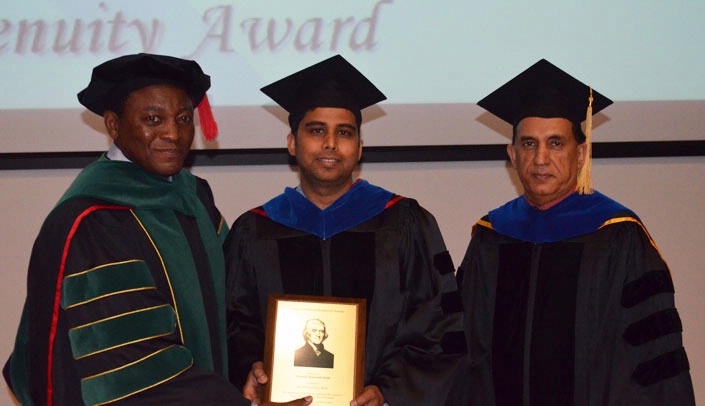In May, Srustihdhar Das, Ph.D., was the recipient of the 2015 Thomas Jefferson Ingenuity Award. Graduate Posts caught up with Dr. Das, who is now a postdoctoral fellow in the lab of Eduardo Villablanca in the Translational Immunology Unit at the Karolinska Institutet, Stockholm, Sweden, to talk to him about his post-UNMC career.
You now are a postdoctoral researcher at the Karolinska Institutet in Sweden. How long have you been there, and what is your research focus?
I have been here for a little more than three months now. The primary focus of my research here is to understand the role of the gut (including intestinal epithelial cells, intestinal immune cells and the microbiota) as an immune-educating organ, and how changes in the intestinal homeostasis (under steady-state and pathological conditions) influence the intestinal and extra-intestinal immune disorders, including cancer. To address these questions, we are making use of mouse as well as zebra fish model systems.
What has been most exciting about your move from Nebraska to Sweden?
Both UNMC in Nebraska and the Karolinska Institutet in Sweden have been great places to work. While at UNMC, the major focus of my research was cancer biology, primarily understanding the role of mucins in cancer. Here at Karolinska, I am more excited about understanding the role of immune system in health and diseases including cancer. Karolinska is very much an international place with people from all over the world, and Stockholm is one of the greatest cities in which to live (although it comes with a huge price). However, I believe that winter in Nebraska has prepared me to survive the long and dark winter in Sweden (approaching soon).
How does your current work fit into your long-range career goals? Do you see yourself coming back to UNMC?
Even though each of us harbor some genetic mutations, not all of us develop cancer, and one of the reasons is that our immune system keeps the mutated cells under check by a process called immunosurveillance. Therefore, one of my long-term career goals is to understand how the immune system differentiates a healthy vs. diseased cell and mounts an effective immune response to protects us and when does it succumb to the disease. I believe with my background in cancer biology at UNMC and in immunology here at Karolinska, I would be able to address some of the fundamental questions about our immune system and the cancer using simpler organisms such as zebra fish.
With the new cancer center being built, UNMC is growing into one of the fast growing cancer research centers in the USA. Having known and worked at UNMC for six years, I will be more than happy to come back to UNMC (provided everything falls into place) and will be proud to contribute to its growing research profile.
How did your mentors and professors and UNMC prepare you for the challenges and rigors of postdoctoral work?
My Ph.D. training in Dr. Surinder Batra’s lab at UNMC played a very important role in shaping my scientific career. Particularly, he had a lot of confidence in me and gave me a lot of freedom in planning and executing my research work.
Besides research training, writing fellowships and grants was the other most important training I received while at Dr. Batra’s Lab at UNMC (given the current funding scenarios around the globe, it is an equally important training as conducting research). His constant encouragement to apply for independent fellowships and grants from various sources led me to procure funding from the U.S. Department of Defense. In addition, Dr. Permender Mehta, Dr. Michael Hollingswoth and Dr. Michelle Ouellete had a significant impact in my professional as well as personal life during my graduate studies at UNMC, and I feel very confident in facing the challenges and rigors of the postdoctoral work at Karolinska.
